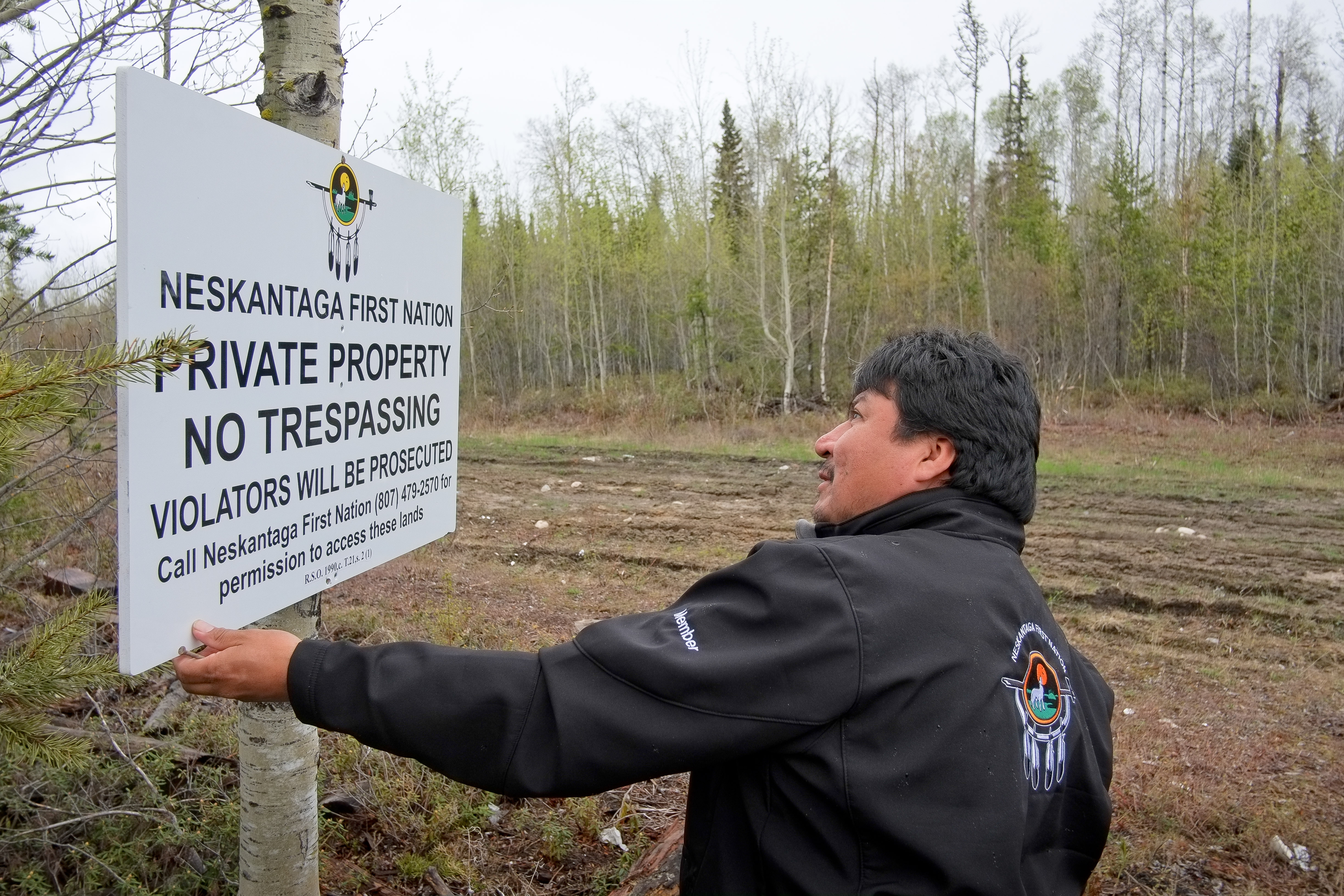By Tim Groves
Special to the Dialog

Former Chief Roy Moonlas puts up a “No Trespassing” sign at the entrance to the winter road leading to Neskantaga First Nation in the Ring of Fire. Photo: Allan Lissner / Praxis
TORONTO—In late July, hundreds of First Nations chiefs from across the country backed a moratorium on mining and development in an area of Northern Ontario known as the “Ring of Fire.”
They also called for the eviction of companies operating in the mineral rich area, which has been described as “Ontario’s oil sands”.
The province has called the Ring of Fire “one of the most promising mineral development opportunities in Ontario in almost a century.” The area contains the largest chromite deposits in North America, as well as gold, nickel, copper, platinum and palladium.
Opening the area to development has become a major focus for the Dalton McGuinty government.
The moratorium demand and eviction notices were voted on by the hundreds of First Nations chiefs gathered in Toronto for the Assembly of First Nations’ (AFN) Annual General Assembly. The AFN is the largest First Nations advocacy organization in the Canada.
“It is solidarity,” said Sonny Gagnon the Chief of Aroland First Nation, whose community would be impacted by the development. “We need the support. If and when we need to go on the land to enforce the evictions notice…we will have 633 First Nations that will be behind us.”
Over 20 mining companies have claims in the Ring of Fire; however a major impediment to these projects is that there is currently no ground access into the area. Several companies are now competing to build road or rail access.
Proposals from two of these companies, Noront Resourses and Cliffs Natural Resources, have entered the province’s environmental assessment stage. This has lead First Nations to believe that the projects are moving ahead without obtaining their “free, prior and informed consent,” as laid out in the United Nations Declaration on the Rights of Indigenous Peoples.
In late June, the Matawa First Nations Council, which is made up of nine first nations communities, announced an “immediate moratorium on all mining exploration and development…unless, and until, Ontario and Canada come to a government-to-government table with a mandate to negotiate fundamental questions of First Nations jurisdiction…and real resource benefits and revenue sharing for our First Nation.”
“We hope that the Matawa Tribal Council communities will reconsider this action and come to the table to discuss their concerns with us,” said Andrew Morrison, a spokes person for the Ontario Ministry of Northern Development and Mines, in an email to the Toronto Media Coop.
“We recognize that there are differing views and positions on First Nations’ jurisdiction and rights. Those differing views do not diminish Ontario’s commitment to working constructively with First Nations and industry to achieve practical outcomes and results,” explained Morrison. “Through good will, mutual respect, and ongoing dialogue we are confident that we can resolve these concerns in a positive, productive and meaningful way.”
Chief Gagnon sees the province’s dealings with First Nations very differently. “They just seem to want to come into my community, stand on a podium and preach to our people as to how they are going to develop this land. No, no, no. We have got to have dialogue.”
He believes that for First Nations to be treated as equal partners they need to be provided with the resources to hire lawyers, geologist and other consultants that the government and mining companies are able to afford.
Cliffs Natural Resources and Noront Resources were among the companies that were issued eviction notice in late June 2012. Both companies refused to respond to a request to comment in this article.
Gagnon said that an action plan to enforce eviction notices was being developed, but would not reveal any of the details.
Tim Groves is a Toronto-based researcher and journalist. This article was first published in The Dominion.

